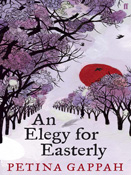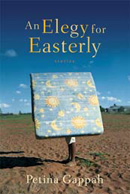


Faber and Faber (UK), paperback, 9780571246939
Faber and Faber (US), paperback, 9780865479302 (June)
This debut collection of short stories from Petina Gappah was the winner of the 2009 Guardian First Book Award, and was shortlisted for the Frank O'Connor International Short Story Award, two of the more prestigious literary prizes. Gappah was born in Zimbabwe and received degrees in Zimbabwe, the UK and Austria. She has lived and worked as a trade lawyer in Geneva, Switzerland for the past 10 years, and only began to write seriously a few years ago, as her first short story was published in 2006.
An Elegy for Easterly consists of 13 stories about Zimbabweans from all backgrounds, living in the country and abroad in the US and Europe. What distinguishes this collection of stories from much of the recent fiction set in Africa is that its characters are not all victims of postcolonialism or the oppressive Mugabe regime. Several are from the privileged classes, such as the widow of a recently deceased government official in "At the Sound of the Last Post", and the wife of a wealthy London-based banker found "In the Heart of the Golden Triangle". All of these stories were based on true events, and many have an appeal and relevance beyond Zimbabwe and Africa.
The title story is set in a shantytown that was created after the poorest residents of Harare, the Zimbabwean capital, were expelled prior to Queen Elizabeth's visit. The displaced townspeople engage in a daily struggle to survive, but they are able to laugh, love and dream of better times in the future. My favorite story was "The Mupandawana Dancing Champion", a warm and humorous tale about an old man, M'dhara Vitalis Mukaro, who stuns his friends and neighbors by winning a local dance competition. Gappah's description of the disco bar, the dancers and M'dhara Vitalis' outfit allow the reader to easily envision the joviality and passion of the event:
M'dhara Vitalis danced them off the floor to the sidelines where they stood to watch with the rest of us. He knew all the latest dances, and the oldest too. We gaped at his reebok and his water pump. He stunned us with his running man. He killed us with his robot. And his snake dance and his break dance made us stand and say ho-o. His moonwalk would have made Michael himself stand and say ho-o. The floor cleared, until only he and the fashion-and-fabrics teacher were dancing.
Other stories of note include "The Annex Shuffle", in which a university student is committed to a mental hospital after her boyfriend breaks up with her and she overdoses on aspirin; "Aunt Juliana's Indian", which involves the relationship of the narrator's aunt with her Indian employer during and after independence; and "My Cousin-Sister Rambanai", a story about a young woman whose family believes she has found success in America, but later discover the difficulties she and others like her face in the underground economy in the US and UK.
An Elegy for Easterly is an impressive debut collection of short stories from a unique and assured voice.
Her first novel, The Book of Memory, will be published in January 2011.
